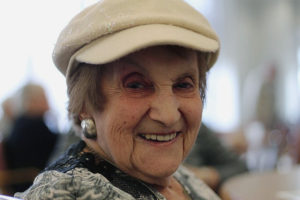
By Christopher Peak
As a child growing up near Prague, Mila Nishball saw her weekly trips to the synagogue as a chance to gab with her girlfriends rather than to participate in her family’s religious tradition.
But today, Nishball still tears up when she recalls visiting the site in the late 1980s to discover that the synagogue was gone. It had been torn down by the Nazis after she’d gone into hiding and then fled Czechoslovakia with help from an American-born boy.
“I cried so much,” she said, “because this place that had meant nothing once was now so important to me.”
Nishball, a recent arrival at Tower One-Tower East, who’s going on 97 years old, thought back to those searing memories on Thursday, March 7, as Mayor Toni arrived at the New Haven assisted-living facility to sign a proclamation remembering the Holocaust on an annual day marking the tragedy.
During World War II the Nazis murdered six million Jews in an attempt to wipe out Jewish people and several other ethnic groups like Romani and Slavic peoples, while also persecuting people with disabilities, gays and lesbians, religious groups and political dissidents.
Nishball didn’t talk publicly about what she’d endured, but she had a five-page account of her memories that she had stashed in a compartment in her walker.
She remembered being a 17-year-old, recently kicked out of school by Nazi orders, when her parents set her up with a 21-year-old, New York-born orphan who’d managed to apply for an American passport just in time. Her parents agreed to pay for the voyage to America, as long as he’d take their daughter. A few days after meeting at a coffee shop, they married at City Hall.
He eventually left to get a job in America so he could pay for her to follow him. But while Nishball waited for her immigration papers to arrive, the Nazis shut down the family business, confiscated their truck and car and ordered them out of their home. “These are only material things we are leaving,” Nishball’s mom said. “We still have each other.”
They moved into a Jewish ghetto, three families to a room, where she’d be stuck for a year and a half. Her old classmates used to smuggle food to her through the gates, defying the German occupiers.
But the Gestapo made arrests daily. One day they tried to frame Nishball’s father for swearing at them. She found him bruised in the courtyard, nearly dead. He died the next day.
Just when she’d given up hope, the visa arrived. Her mother snuck into the city with her to see her off on a train to Lisbon. They couldn’t bring themselves to say “goodbye,” so they just said “so long.”
After a 10-day trek across the Atlantic, Nishball arrived in New York City to meet her husband, then made her way to Bridgeport. They eventually had a baby boy.
“I didn’t like this country, this America,” Nishball had written. “I wanted to be back home where my child would have grandparents that loved him and give me a helping hand. I missed my country.
“It’s funny how you can forget the bad things and only remember the good. When I thought of home, I didn’t think of the crowded ghetto, the arrest, and the restriction laws. All I thought of was my sweet home and the family I would go back to when the war was over,” she went on.
“Then the war was over, and I found out there was nobody and nothing to go back to,” Nishball concluded. “That’s the time I became a realist. There was no sense in longing for something that could never be. That’s the time I realized that life here isn’t so bad after all. Get on with your life. My family, my friends are here. That’s the time that I realized that maybe this America is the best country in the world. That’s the time I became an American.”
Another Holocaust survivor at Tower One-Tower East, Izzy Juda, said he hopes that future generations don’t forget after the last living reminders are gone.
“People can become stagnant,” he said. “People can forget. But I hope they don’t.”
This is an excerpt of an article that appeared in New Haven Independent (newhavenindependent.org) and is reprinted with permission.
CAP: Mayor Toni Harp signs Holocaust Proclamation Friday.







 Southern New England Jewish Ledger
Southern New England Jewish Ledger















